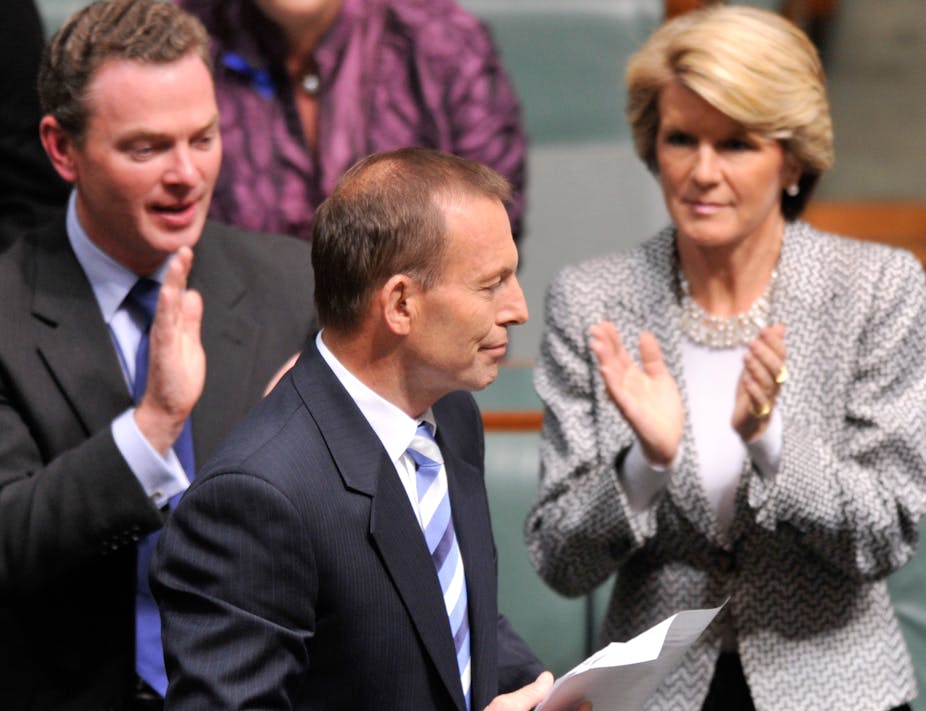“Only an election could make an honest politician of this Prime Minister. Only an election can give Australia a government with authority to make the tough decisions needed to build a stronger Australia and help Australians get ahead.” Tony Abbott, budget reply, 2011.
It’s a truism that we hear what we want to hear.
Sometimes, a deceptively simple sentence can convey myriad meanings. Such was the case with Tony Abbott’s carefully crafted swipe at Julia Gillard in his recent budget reply speech. What did you hear? We asked some academics to interrogate the meaning behind these lines.
Dr Dennis Grube, Department of Politics and Public Policy, Griffith University
“It’s the politics, stupid.” That is the phrase that has been effectively tattooed on every piece of Tony Abbott’s rhetoric since he became Opposition Leader.
Abbott knows that politics is an emotional science. It is visceral, instinctual and often counter-logical. While the Government hammers away with complex messages about the two-speed economy, they are losing the rhetorical battle to an Opposition Leader who is framing the public debate in the way that he wants it framed.
One person’s carbon pollution pricing mechanism is another person’s great big new tax.
One person’s attempt to freeze middle-class welfare is another person’s attack on “forgotten families”.
Overwhelmingly, it is Abbott’s characterisations that are dominating the debate.
By suggesting in his Budget reply speech that the Prime Minister needs to make an “honest politician” of herself, Abbott has engaged in a bit of rhetorical mischief.
He is playing with the language, and is far too skilful a politician not to know that it will result in cries of outrage in some quarters.
That outrage – of course – will keep the focus on Abbott’s messages rather than the Government’s.
The very fact that we are addressing the issue in this column shows that the words have done the work that Abbott sent them out to do.
The phrase is unlikely to have a major impact on the Prime Minister’s standing, but that was probably not the intention. Is it about the politics? – You better believe it.
Professor Carol Johnson, School of History and Politics, University of Adelaide
This part about “making an honest politician” of her is an obvious gendered reference to the Prime Minister being an unmarried woman. He also made gendered references in the speech when he referred to his family, his wife and daughters.
He was suggesting that Julia Gillard doesn’t have a family and therefore couldn’t understand ordinary Australians and the financial pressures they are facing.
This is a common line of attack and he has been making veiled references to her being unmarried and not having children for some time. It’s part of a pattern for him.
Part of what’s happening here is that female politicians have problems managing to appear tough enough and compassionate enough. Abbott is taking a double pronged attack. He is suggesting she is not tough enough because she is female but at the same time because she doesn’t have children and is unmarried she can’t understand the circumstances of ordinary Australians.
He is suggesting she is not enough of a woman when it comes to compassion and empathy but too much of a woman when it comes to not being tough enough.
Words like “tough”, “authority” and “stronger” are very gendered. He has been making reference to her gender for some time and is using his masculinity in his imagery and political persona.
The implication is she is not tough enough or strong enough.
But even if there was another election, the chances are the coalition would not have the majority in the Senate, so he may well find he couldn’t get some of his legislation through.
Dr Virginia Watson, Senior Lecturer, Cultural Studies Group, University of Technology, Sydney
I think that there’s a good measure of big C chauvinism – behind the (laughable) claim that strong political leadership is linked to ‘honesty’ (you can be pretty sure Abbott knows his Machiavelli or more specifically, The Prince!).
More generally though, I read this statement as one which Abbott hopes will work on a number of levels.
First, it calls into question the means by which Gillard came to be PM: and the fact that she negotiated “deals” with the Greens and Independent members to form a minority government.
Second, it calls into question the means by which Gillard secured the leadership of the federal ALP – by usurping Rudd.
And third, it works to call into question Gillard’s “femininity”: how can a childless, ambitious and intelligent woman “really” be an “honest” woman?
Geoff Kelly, School of Media and Communication, RMIT
Technically, it’s a reasonable statement. But from a speech-making point of view, it’s a bit long and I think it loses people.
Kevin Rudd used to speak in long sentences and use complex language. I think this sentence may have been too clever.
By repeating the point about the election, Abbott wants to cast doubt on the legitimacy on this government.
That’s what he is been doing since the beginning. That’s one of his messages.

